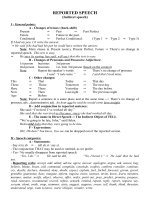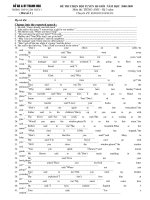Reported speech
Bạn đang xem bản rút gọn của tài liệu. Xem và tải ngay bản đầy đủ của tài liệu tại đây (30.35 KB, 4 trang )
Reported speech
Change of Adv of time
Reported speech
1. Change of adv of time
Today → that day
Yesterday → the day before / the previous day
The day before yesterday → two days before
Tomorrow → the next day/ the following day
The day after tomorrow → in two days’ time
(two days later)
Next week/ year → the following week/ year
3. Change of tenses
1. Present simple → past simple
“I don’t like this film” he said.
→ He said he didn’t like that film
2. Present continuous → past continuous
“ I am doing my homework now.” she said.
→ She said she was doing her homework
then.
5. Past simple → past perfect ( used to
doesn’t change)
“ I went to the cinema with Tom last night.”
said Mary.
→ Mary said she had gone to the cinema
with Tom the previous night.
6. Will – would
a. Will / shall do → would do
“ I will be in Ho Chi Minh city on Monday”
she said.
→ She said she would be in Ho Chi Minh
city on Monday.
Last week/ year → the previous week / year
Last week/ year → the previous week / year
A year ago → a year before / the previous
year
Now → then
2. Change of pronouns
Here → there
This → that these → those (Time phrase)
this, these → the (before noun)
3. Present perfect → past perfect
“ I have found a new job.” he said.
→ He said he had found a new job.
4. Present perfect continuous → Past
perfect continuous.
He said “ I’ve been waiting for an hour.”
→ He said he had been waiting for an hour.
b. Will / shall be V- ing → Would be V-ing
“ I will be watching T.V at 8 p. m tomorrow.”
she said
She said she would be watching T.V. at
8p.m the following day.
c. Will have PII → would have PII
“ I will have worked for this company for 30
years when I retired” she said.
She said she would have worked for that
company for 30 years when she retired.
Hội kiểm toán viên hành nghề Việt Nam (VACPA)
Giảng viên: Phan Thị Thanh Tâm
1
Reported speech
Can → could, may → might
Notes.
a. was/ were + V-ing → Had been V-ing
Only when the action had been finished
He said “ We were thinking of selling the
house but we have decided not to.”
→ He said they had been thinking of selling
the house but they had decided not to.
c. wish, would rather it is time (gia
dinh ko doi)
- “ We wish we didn’t have to do our
homework.” said the children.
→ The children wished they didn’t have to
do their homework.
- “ Mary wants to go alone” said Ann” but I’d
rather she went with a group.”
Ann said Mary wanted to go alone but she ‘d
rather she went with a group.
Type 2 & type 3 tenses do not
change
e.g. “If I had a lot of money I would buy a
house.” he said.
→ He said if he had a lot of money he would
buy a house.
- If + question → statement with if at the end
of the sentences.
“ If the baby is a girl what will they call her?”
he wondered. → He wondered what they
would call the baby if it was a girl.
But He said “When I saw them they were
playing football.”
→ He said that when he saw them they
were playing football.
b. Past simple & past continuous in the time
clause do not change.
H e said “ When we lived/ were ling in Paris
we often saw Tom.”
→ He said when they were living / lived in
Paris they often saw/ had often seen Tom.
- It is time we did our home work.
→ It was time we did our homework.
d. Conditionals
- Type 1. Tenses change as usual
e.g. She said “ If I catch the bus I will be
home by 6 p.m.”
→ She said if she caught the bus she would
be home by 6 p. m.
The boss told me that if I worked well I
would get a pay rise
e. Had better
- Do not change.
“The children had better go to bed.” said
Mary
→ Mary said that the children had better go
to bed.
- Advise sb to do ( not to do sth)
“You’d better not smoke.” he said to me
→ He advised me not to smoke.
Hội kiểm toán viên hành nghề Việt Nam (VACPA)
Giảng viên: Phan Thị Thanh Tâm
2
Reported speech
Say/ tell at present simple
Do not change the adv of time and tenses.
e.g. “ She isn’t sleeping now.” he says.
→ He says she isn’t sleeping now.
2. yes/no questions
“ Do you live in Hanoi?” Tom asked Nga
Tom asked Nga if/ whether she lived in
Hanoi.
“ Did you go to school yesterday?” he asked
me
He asked me if/ whether I had gone to
school the previous day.
4. Indirect questions
“ Do you know where she lives?” he asked
me.
→ He asked me if/ whether I knew where
she lived.
- Whether focuses on the choice.
“Do you want to go by air or by sea?” he
asked.
He asked whether I wanted to go by air or
by sea.
1. Statement (cau tran thuat)
“ I have done my homework” she said .
→ She said that she had done her
homework.
“ I’m waiting for you.” Tom told me.
Tom told me that he was waiting for me.
3. Wh- questions
“Where do you live?” she asked me
She asked me where I lived.
“What did you do last night?” my mother
asked me
My mother asked me what I had done the
previous night.
Whether or not
“Do you want to insure your luggage or not?”
he asked
→ he asked whether or not I wanted to
insure my luggage.
Or He asked if I wanted to insure my
luggage or not.
Hội kiểm toán viên hành nghề Việt Nam (VACPA)
Giảng viên: Phan Thị Thanh Tâm
3
Reported speech
5. imperatives
• “ Listen to me” he said to me.
He told/ asked me to listen to him.
“Don’t talk during the lesson.” Tom said to
Mary.
→ Tom asked/ told Mary not to talk during
the lesson.
7. Suggestion
Shall we
Let’s do
Why don’t we
What about V-ing
How about V-ing
Suggest V-ing (dong chu ngu)
Suggest that sb should do sth speaker and the writer do
not take part in the action
“Why don’t you go to the cinema with Tim?” Mary said to
Ann.
Mary suggested that Ann should go to the cinema with Tim.
6. advise
If I were you
You should
You had better
You ought to
Why don’t you do
Advise sb to V ( not to V)
e.g. “If I were you I wouldn’t tell him the truth.” he
said to Mary → He advised Mary not to tell him
the truth.
“ Why don’t we go out for a walk?”. She said
to me.
She suggested going out for a walk.
“ Why don’t you take a rest?” he said to me
He suggested that I should take a rest.
8. Invitation
• Offer/ invite sb sth
• Invite sb to do st
“ Would you like some coffee?” she said to
Mary.
• She offered/ invited Mary some coffee.
“Would you like to go to the cinema with me
tonight?” He said to Mary.
• He invited Mary to go to the cinema with
him that night.
Hội kiểm toán viên hành nghề Việt Nam (VACPA)
Giảng viên: Phan Thị Thanh Tâm
4









